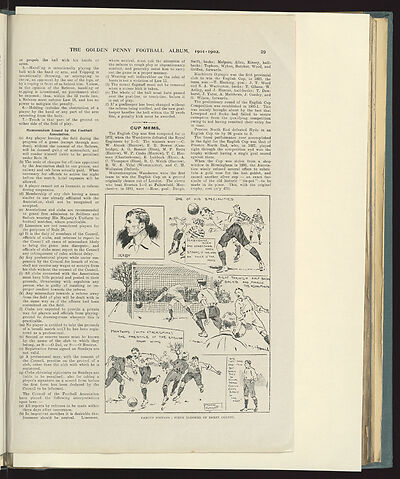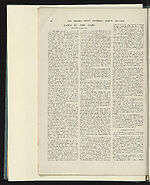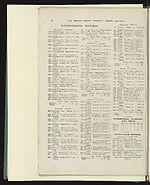Download files
Complete book:
Individual page:
Thumbnail gallery: Grid view | List view

I
or
propels
the
ball
with
his
hands
or
arms.
5.—Handling
is
intentionally
playing
the
ball
with
the
hand
or
arm,
and
Tripping
is
intentionally
throwing,
or
attempting
to
throw,
an
opponent
by
the
use
of
the
legs,
or
by
s_ooping
in
front
of
or
behind
him.
Unless,
in
the
opinion
of
the
Referee,
handling
or
tr:pping
is
intentional,
no
punishment
shall
be
imposed;
thus,
within
the
12
yards
line,
a
Referee
must
enforce
Law
14,
and
has
no
power
to
mitigate
the
penalty.
6.—Holding
includes
the
obstruction
of
a
player
by
the
hand
or
any
part
of
the
arm
extending
from
the
body.
7.—Touch
is
that
part
of
the
ground
on
either
side
of
the
field
of
play.
Memorandum
Issued
by
the
Football
Association.
(a)
Any
player
leaving
the
field
during
the
progress
of
a
game
(except
through
acci-
dent),
without
the
consent
of
the
Referee,
will
be
deemed
guilty
of
misconduct,
and
will
render
himself
liable
to
be
penalised
underRule
'28.
(b)
line
scale
of
charges
for
officials
appointed
by
the
Association
shall
be
one
guinea,
and
railway
and
cab
fares
actually
paid.
When
necessary
for
officials
to
arrive
the
night
before
the
match,
hotel
expenses
will
be
allowed.
(c)
A
player
cannot
act
as
linesman
or
referee
during
suspension.
(d)
Membership
of
any
club
having
a
name
similar
to
one
already
affiliated
with
the
Association,
shall
not
be
recognised
or
accepted.
(e)
Associations
and
clubs
are
recommended
to
grant
free
admission
to
Soldiers
and
Sailors
wearing
His
Majesty's
Uniform
to
football
matches,
where
practicable.
(f)
Linesmen
are
not
considered
players
for
the
purposes
of
Rule
34.
(g)
It
is
the
duty
of
members
of
the
Council,
officials
of
clubs,
and
referees
to
report
to
the
Council
all
cases
of
misconduct
likely
to
bring
the
game
into
disrepute;
and
officials
of
clubs
must
report
to
the
Council
any
infringement
of
rules
without
delay.
(h)
Any
professional
player
while
under
sus-
pension
by
the
Council
for
breach
of
rules,
shall
not
receive
any
wages
or
moneys
from
his
club
without
the
consent
of
the
Council.
(i)
All
clubs
connected
with
the
Association
must
have
bills
printed
and
posted
in
their
grounds,
threatening
with
expulsion
any
person
who
is
guilty
of
insulting
or
im-
proper
conduct
towards
the
referee.
(k)
Any
misconduct
towards
a
referee
away
from
the
field
of
play
will
be
dealt
with
in
the
same
way
as
if
the
offence
had
been
committed
on
the
field.
(1)
Clubs
are
expected
to
provide
a
private
way
for
players
and
officials
from
playing-
ground
to
dressing-room
wherever
this
is
practicable.
(m)
No
player
is
entitled
to
take
the
proceeds
of
a
benefit
match
until
he
has
been
regis-
tered
as
a
professional.
(n)
Second
or
reserve
teams
must
be
known
by
the
name
of
the
club
to
which
they
belong,
as
S—O
2nd,
or
S—O
Reserve.
(o)
Registration
forms
signed
on
Sundays
are
not
valid.
(p)
A
professional
may,
with
the
consent
of
the
Council,
practise
on
the
ground
of
a.
club,
other
than
the
club
with
which
he
is
registered.
(q)
Clubs
obtaining
signatures
on
Sundays
are
liable
to
be
penalised;
also
for
taking
a,
player's
signature
on
a
second
form
before
the
first
form
has
been
declared
by
the
Counesl
to
be
informal.
The
Council
of
the
Football
Association
have
placed
the
following
interpretations
upon
laws:—
(a)
All
reports
by
referees
to
be
made
within
three
days
after
occurrence.
(b)
In
important
matches
it
is
desirable
that
linesmen
should
be
neutral.
Linesmen,
where
neutral,
must
tali
the
attention
of
the
referee
to
rough
play
or
ungentlemanly
conduct,
and
generally
assist
him
to
carry
out
the
game
in
a
proper
manner.
(c)
Wearing
soft
indiarubber
on
the
soles
of
boots
is
not
a
violation
of
Law
11.
(d)
The
corner
flagstaff
must
not
be
removed
when
a
corner
kick
is
taken.
(e)
The
whole
of
the
ball
must
have
passed
over
the
goal-line,
or
touch-line,
before
it
is
out
of
play.
(f)
,If
a
goalkeeper
has
been
changed
without
the
referee
being
notified,
and
the
new
goal-
keeper
handles
the
ball
within
the
12
yards
line,
a
penalty
kick
must
be
awarded.
CUP
MEMS.
The
English
Cup
was
first
competed
for
in
1872,
when
the
Wanderers
defeated
the
Royal
Engineers
by
1-0.
The
winners
were:—C.
W.
Alcock
(Harrow),
E.
E.
Bowen
(Cam-
bridge),
A.
G.
Bonsor
(Eton),
M.
P.
Betts
(Harrow),
W.
P.
Crake
(Harrow),
T.
C.
Hoo-
man
(Charterhouse),
E.
Lubbock
(Eton),
A.
C.
Thompson
(Eton),
R.
C.
Welch
(Harrow),
R.
W.
S.
Vidal
(Westminster),
and
C.
H.
Wollaston
(Oxford).
Wolverhampton
Wanderers
were
the
first
team
to
win
the
English
Cup
on
a
ground
originally
chosen
out
of
London.
The
elEven
who
beat
Everton
1-0
at
Fallowfield,
Man-
chest^.r,
in
1893,
were:—Rose,
goal;
Baugh,
.',—
a=r__.
MAINTAIMS
(WITHAT
HE-K%M
ITN)
THEPRESTIGEofTHE
EnC,L1511
RICIHTW1rq
IJ
Swift,,
backs;
Malpass,
Allen,
Kinsey,
half-..
backs;
Topham,
Wykes,
Butcher,
Wood,
and
Griff
en,
forwards.
Blackburn
Olympic
was
the
first
provincial
club
to
win
the
English
Cup,
in
1883,
the
team
was:—T.
Hacking,
goal;
J.
T.
Ward
and
S.
A.
Warburton,
backs;
T.
Gibson,
W.
Astley,andJ.
Hunter;
half-backs;T.Dew-
hurst,
J.
Yates,
A.
Matthews,
J.
Costley,
and
G.
Wilson,
forwards.
The
preliminary
round
of
the
English
Cup
Competition
was
established
in
1900-1.
This
was
mainly
brought
about
by
the
fact
that
Liverpool
and
Stoke
had
failed
to
secure
exemption
from
the
qualifying
competition
owing
to
not
having
remitted
their
entry
fee
in
time.
Preston
North
End
defeated
Hyde
in
an
English
Cup
tie
by
26
goals
to
0.
The
finest
performance
ever
accomplished
in
the
fight
for
the
English
Cup
was
that
of
Preston
North
End,
who,
in
1887,
played
right
through
the
competition
and
won
the
trophy
without
having
a
single
goal
scored
against
them.
When
the
Cup
was
stolen
from
a
shop
window
in
Birmingham
in
1895,
the
Associa-
tion
wisely
refused
several
offers
to
substi-
tute
a
gold
vase
for
the
lost
goblet,
and
caused
another
silver
cup
—
an
exact
fac-
simile
of
the
old
historic
"
tin-pot
"—to
be
made
in
its
place.
This,
with
the
original
trophy,
cost
only
£20.
-1_
—
RI"HT
TH
Rou
H
H
ALF
•
gACx-
BACKS
ANo,FINALLY
THE
�CUALPag�
I+
ILA
Xi
'V_cz�
Hls
'OFF'
DAYS
ARE
.FE—
gu-
vvHEn
'+
T1.
Ey
/
Do
occup-
DERBY
::
+
GETS
6Ao�Y
5n
M4
E.
C
AR-7
3402
1879
397
OFHISSPEr_IAL1T1E5
DERBYSHIRE
BORN
AIVO
DERBYSHIRE
BRED
STROnry
O
"rHEARrJ
ANA
THIr-KOTHE
HEAD
FAMOUS
FOOTERS
:
STEVE
BLOOMER
OF
DERBY
COUNTY.
or
propels
the
ball
with
his
hands
or
arms.
5.—Handling
is
intentionally
playing
the
ball
with
the
hand
or
arm,
and
Tripping
is
intentionally
throwing,
or
attempting
to
throw,
an
opponent
by
the
use
of
the
legs,
or
by
s_ooping
in
front
of
or
behind
him.
Unless,
in
the
opinion
of
the
Referee,
handling
or
tr:pping
is
intentional,
no
punishment
shall
be
imposed;
thus,
within
the
12
yards
line,
a
Referee
must
enforce
Law
14,
and
has
no
power
to
mitigate
the
penalty.
6.—Holding
includes
the
obstruction
of
a
player
by
the
hand
or
any
part
of
the
arm
extending
from
the
body.
7.—Touch
is
that
part
of
the
ground
on
either
side
of
the
field
of
play.
Memorandum
Issued
by
the
Football
Association.
(a)
Any
player
leaving
the
field
during
the
progress
of
a
game
(except
through
acci-
dent),
without
the
consent
of
the
Referee,
will
be
deemed
guilty
of
misconduct,
and
will
render
himself
liable
to
be
penalised
underRule
'28.
(b)
line
scale
of
charges
for
officials
appointed
by
the
Association
shall
be
one
guinea,
and
railway
and
cab
fares
actually
paid.
When
necessary
for
officials
to
arrive
the
night
before
the
match,
hotel
expenses
will
be
allowed.
(c)
A
player
cannot
act
as
linesman
or
referee
during
suspension.
(d)
Membership
of
any
club
having
a
name
similar
to
one
already
affiliated
with
the
Association,
shall
not
be
recognised
or
accepted.
(e)
Associations
and
clubs
are
recommended
to
grant
free
admission
to
Soldiers
and
Sailors
wearing
His
Majesty's
Uniform
to
football
matches,
where
practicable.
(f)
Linesmen
are
not
considered
players
for
the
purposes
of
Rule
34.
(g)
It
is
the
duty
of
members
of
the
Council,
officials
of
clubs,
and
referees
to
report
to
the
Council
all
cases
of
misconduct
likely
to
bring
the
game
into
disrepute;
and
officials
of
clubs
must
report
to
the
Council
any
infringement
of
rules
without
delay.
(h)
Any
professional
player
while
under
sus-
pension
by
the
Council
for
breach
of
rules,
shall
not
receive
any
wages
or
moneys
from
his
club
without
the
consent
of
the
Council.
(i)
All
clubs
connected
with
the
Association
must
have
bills
printed
and
posted
in
their
grounds,
threatening
with
expulsion
any
person
who
is
guilty
of
insulting
or
im-
proper
conduct
towards
the
referee.
(k)
Any
misconduct
towards
a
referee
away
from
the
field
of
play
will
be
dealt
with
in
the
same
way
as
if
the
offence
had
been
committed
on
the
field.
(1)
Clubs
are
expected
to
provide
a
private
way
for
players
and
officials
from
playing-
ground
to
dressing-room
wherever
this
is
practicable.
(m)
No
player
is
entitled
to
take
the
proceeds
of
a
benefit
match
until
he
has
been
regis-
tered
as
a
professional.
(n)
Second
or
reserve
teams
must
be
known
by
the
name
of
the
club
to
which
they
belong,
as
S—O
2nd,
or
S—O
Reserve.
(o)
Registration
forms
signed
on
Sundays
are
not
valid.
(p)
A
professional
may,
with
the
consent
of
the
Council,
practise
on
the
ground
of
a.
club,
other
than
the
club
with
which
he
is
registered.
(q)
Clubs
obtaining
signatures
on
Sundays
are
liable
to
be
penalised;
also
for
taking
a,
player's
signature
on
a
second
form
before
the
first
form
has
been
declared
by
the
Counesl
to
be
informal.
The
Council
of
the
Football
Association
have
placed
the
following
interpretations
upon
laws:—
(a)
All
reports
by
referees
to
be
made
within
three
days
after
occurrence.
(b)
In
important
matches
it
is
desirable
that
linesmen
should
be
neutral.
Linesmen,
where
neutral,
must
tali
the
attention
of
the
referee
to
rough
play
or
ungentlemanly
conduct,
and
generally
assist
him
to
carry
out
the
game
in
a
proper
manner.
(c)
Wearing
soft
indiarubber
on
the
soles
of
boots
is
not
a
violation
of
Law
11.
(d)
The
corner
flagstaff
must
not
be
removed
when
a
corner
kick
is
taken.
(e)
The
whole
of
the
ball
must
have
passed
over
the
goal-line,
or
touch-line,
before
it
is
out
of
play.
(f)
,If
a
goalkeeper
has
been
changed
without
the
referee
being
notified,
and
the
new
goal-
keeper
handles
the
ball
within
the
12
yards
line,
a
penalty
kick
must
be
awarded.
CUP
MEMS.
The
English
Cup
was
first
competed
for
in
1872,
when
the
Wanderers
defeated
the
Royal
Engineers
by
1-0.
The
winners
were:—C.
W.
Alcock
(Harrow),
E.
E.
Bowen
(Cam-
bridge),
A.
G.
Bonsor
(Eton),
M.
P.
Betts
(Harrow),
W.
P.
Crake
(Harrow),
T.
C.
Hoo-
man
(Charterhouse),
E.
Lubbock
(Eton),
A.
C.
Thompson
(Eton),
R.
C.
Welch
(Harrow),
R.
W.
S.
Vidal
(Westminster),
and
C.
H.
Wollaston
(Oxford).
Wolverhampton
Wanderers
were
the
first
team
to
win
the
English
Cup
on
a
ground
originally
chosen
out
of
London.
The
elEven
who
beat
Everton
1-0
at
Fallowfield,
Man-
chest^.r,
in
1893,
were:—Rose,
goal;
Baugh,
.',—
a=r__.
MAINTAIMS
(WITHAT
HE-K%M
ITN)
THEPRESTIGEofTHE
EnC,L1511
RICIHTW1rq
IJ
Swift,,
backs;
Malpass,
Allen,
Kinsey,
half-..
backs;
Topham,
Wykes,
Butcher,
Wood,
and
Griff
en,
forwards.
Blackburn
Olympic
was
the
first
provincial
club
to
win
the
English
Cup,
in
1883,
the
team
was:—T.
Hacking,
goal;
J.
T.
Ward
and
S.
A.
Warburton,
backs;
T.
Gibson,
W.
Astley,andJ.
Hunter;
half-backs;T.Dew-
hurst,
J.
Yates,
A.
Matthews,
J.
Costley,
and
G.
Wilson,
forwards.
The
preliminary
round
of
the
English
Cup
Competition
was
established
in
1900-1.
This
was
mainly
brought
about
by
the
fact
that
Liverpool
and
Stoke
had
failed
to
secure
exemption
from
the
qualifying
competition
owing
to
not
having
remitted
their
entry
fee
in
time.
Preston
North
End
defeated
Hyde
in
an
English
Cup
tie
by
26
goals
to
0.
The
finest
performance
ever
accomplished
in
the
fight
for
the
English
Cup
was
that
of
Preston
North
End,
who,
in
1887,
played
right
through
the
competition
and
won
the
trophy
without
having
a
single
goal
scored
against
them.
When
the
Cup
was
stolen
from
a
shop
window
in
Birmingham
in
1895,
the
Associa-
tion
wisely
refused
several
offers
to
substi-
tute
a
gold
vase
for
the
lost
goblet,
and
caused
another
silver
cup
—
an
exact
fac-
simile
of
the
old
historic
"
tin-pot
"—to
be
made
in
its
place.
This,
with
the
original
trophy,
cost
only
£20.
-1_
—
RI"HT
TH
Rou
H
H
ALF
•
gACx-
BACKS
ANo,FINALLY
THE
�CUALPag�
I+
ILA
Xi
'V_cz�
Hls
'OFF'
DAYS
ARE
.FE—
gu-
vvHEn
'+
T1.
Ey
/
Do
occup-
DERBY
::
+
GETS
6Ao�Y
5n
M4
E.
C
AR-7
3402
1879
397
OFHISSPEr_IAL1T1E5
DERBYSHIRE
BORN
AIVO
DERBYSHIRE
BRED
STROnry
O
"rHEARrJ
ANA
THIr-KOTHE
HEAD
FAMOUS
FOOTERS
:
STEVE
BLOOMER
OF
DERBY
COUNTY.
Set display mode to:
![]() Universal Viewer |
Universal Viewer | ![]() Mirador |
Large image | Transcription
Mirador |
Large image | Transcription
Images and transcriptions on this page, including medium image downloads, may be used under the Creative Commons Attribution 4.0 International Licence unless otherwise stated. ![]()
| Sports publications > Golden Penny football album, 1901-1902 > (33) |
|---|
| Permanent URL | https://digital.nls.uk/227640209 |
|---|
| Description | More than 230 sports publications from the National Library of Scotland's collections. Featured sports include football, rugby, golf, shinty, athletics, bowls, cricket and hockey. Among the material from the late 19th and early 20th centuries are match programmes, club histories, and handbooks. From the late 20th century are promotional materials to encourage greater diversity in sport. Most items cover sports activities in Scotland. There are also publications relating to the Olympics and international matches. |
|---|---|
| Additional NLS resources: |
|

